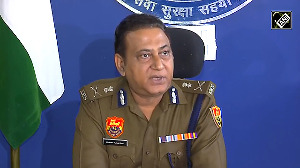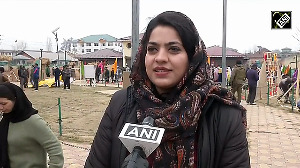He refers to Chabad House in Colaba, south Mumbai, which was attacked by terrorists last week, killing American Rabbi Gavriel Holtzberg and his pregnant wife Rivka, and other Jewish visitors.
"I don't know what will happen to the building. It is owned by the Chabad organisation. They may sell it; it's all up to them," Sharon says. But that would affect traveling Orthodox Jews, who stopped there for food and shelter. "People will have to go back to carrying their own food -- the way it used to be before Chabad House (came into being). Earlier, people had to carry food for 10, 15 days."
But this is only one of the regrets Rabbi Galsulkar has. His biggest regret is that Rabbi Holtzberg did not interact with his neighbours. This, he feels, has given rise to many incorrect impressions, the primary one being that neighbours felt that the terrorists may have lived in Chabad House as they saw suspicious-looking people on the terrace of the building in weeks before the attacks took place.
"People love to talk. They only saw guests coming in and out (of Chabad House). I know the rabbi would never take chances. American-Israelis know the dangers involved. They know they can be targeted, so they always take precautions. Security is important to them. But I wish they had gone to the Colaba police station earlier. I really wish."
"One rarely saw an Indian staying there. There were a lot of workers in that house. If something needed to be fixed, if the electrician was called, he was an Indian, not American. The cook and nanny were Indians. So the building was not exclusively meant for Jewish people. I want to challenge people who say that they suspected they saw terrorists on the terrace. It's very difficult to digest," says Rabbi Galsulkar.
The main problem, he explains, was the language barrier between the English-speaking rabbi and his Hindi-speaking neighbours. And the fact that the rabbi was a man of few words.
"He was a man of few words, but was very satisfied, like a sadhu," Rabbi Galsulkar says. "It was really nice interacting with him. He believed in serving god through work. Chabad House had a very nice spiritual atmosphere."
"They were very orthodox. They would cover themselves fully. His wife would wear a wig, so that her natural hair was not exposed. He would slaughter and clean chickens himself. He was very knowledgeable about kosher food," adds Rabbi Galsulkar.
The slain rabbi, he says, was also very strong in his belief. When he lost his oldest son to a rare blood disorder, he took it in his stride stoically. "He told me it was god's will; we did our job as parents. I would have cried if I were in his place. Of course, he was very upset. People who kill others in the name of religion should have seen his faith," Rabbi Galsulkar says.
This, in fact, is another of his regrets. Rabbi Holtzberg's neighbours never got to know this peace-loving man who left his own country to serve Jews visiting India.
Rabbi Galsulkar does not think the report that Rabbi Holtzberg may have wrapped his wife's body before he died. A woman's body was reportedly found wrapped when National Security Guard commandos overwhelmed the terrorists.
"A woman's body was wrapped in the prayer shawl that we use. It could be the rabbi's work. But normally women aren't wrapped in prayer shawls, men are. So it would have been strange if he had done it. It's questionable," says the Indian rabbi.
Even as he struggles to find answers, he joins the rest of India to praise the NSG, army, fireman and the police. "We need to give them our blessings," he says.






 © 2025
© 2025